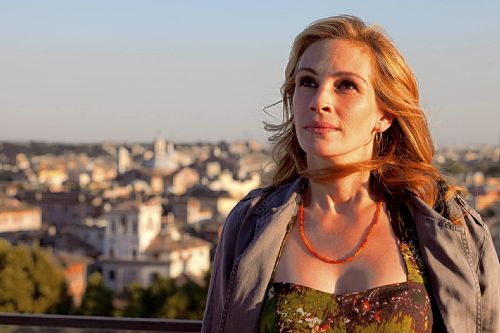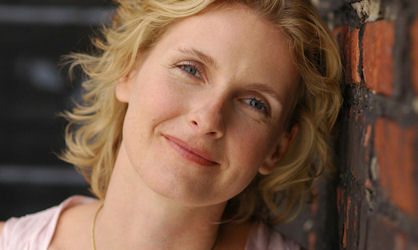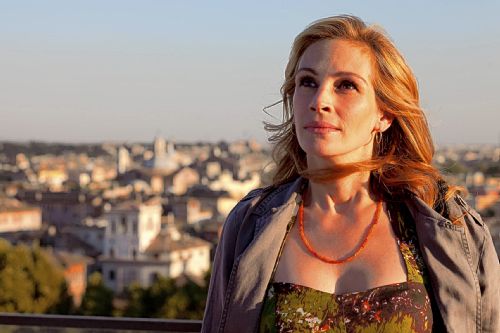 Julia Roberts as Elizabeth Gilbert“Having a baby is like getting a tattoo on your face. You really need to be certain it’s what you want before you commit.”
Julia Roberts as Elizabeth Gilbert“Having a baby is like getting a tattoo on your face. You really need to be certain it’s what you want before you commit.”
So says our protagonist’s best friend, a new mom, in an opening scene of the new movie Eat Pray Love. She goes on to confess that for years she kept a box of baby clothes under her bed, just waiting for her chance to become a mother.
Elizabeth Gilbert (as played by Julia Roberts) responds that she has a box just like that — but it’s stuffed with old issues of National Geographic and clippings from the New York Times travel section.
This is how we learn that Gilbert is unsure about motherhood. She goes on to decide against it, as explained more fully in Eat, Pray, Love the memoir and then Gilbert’s follow-up book, Committed: A Skeptic Makes Peace With Marriage.
Gilbert doesn’t opt against parenthood for environmental reasons — most childfree people don’t. But by raising the possibility that for some people life can be more fully lived and enjoyed without kids, she’s making a green value mainstream. Does it get more mainstream than 183 weeks on the New York Times bestseller list and a strong opening weekend for a Julia Roberts chick flick?
Gilbert makes the case that choosing whether or not to parent should be a deliberate and much-considered endeavor. Well, in Gilbert’s world, every feeling and fleeting thought is obsessively catalogued and analyzed, but while this often comes across as narcissism, in this case, it’s pure and simple wisdom. If there’s any decision that should be exhaustively examined, it’s this one — whether or not to become a parent.
 Elizabeth Gilbert as herselfIn Committed, she scrutinizes her own motives and emotions on the matter, and then quizzes virtually every woman she knows. One of Gilbert’s friends says her kids have been an avalanche of joy. Another says, “Just go for it. It’s not that hard.” A third confesses that she’s not sure her life was bettered by having kids. A fourth friend says she was surprised to find that child rearing could “simultaneously be so awful and so rewarding.” One older woman says simply, “I never had ’em, honey. And I never missed ’em.”
Elizabeth Gilbert as herselfIn Committed, she scrutinizes her own motives and emotions on the matter, and then quizzes virtually every woman she knows. One of Gilbert’s friends says her kids have been an avalanche of joy. Another says, “Just go for it. It’s not that hard.” A third confesses that she’s not sure her life was bettered by having kids. A fourth friend says she was surprised to find that child rearing could “simultaneously be so awful and so rewarding.” One older woman says simply, “I never had ’em, honey. And I never missed ’em.”
Even her mom — by Gilbert’s account, a stellar parent — admitted ambivalence. “I don’t regret anything I ever did for you kids,” she says. But she does wish she hadn’t had to give up her short-lived and much-loved career at Planned Parenthood. And, she admits, “the best part of my life began when you kids grew up and left the house.”
Gilbert takes all this in and ultimately reaches the conclusion that kids aren’t for her.
Unlike so many of my friends, I did not ache with longing whenever I saw an infant. … There was no imperative there, and I believe that child rearing must come with an imperative, must be driven by a sense of longing and even destiny, because it is such a massively important undertaking.
While this realization sets her first marriage on a course for failure, it lays the groundwork for her second, with an older man who has two adult kids and no interest in any more.
That relief — the great thrumming relief that we both felt when we discovered that neither one of us was going to coerce the other into parenthood — still sends a pleasant vibrating hum across our life together. … I had never once considered the possibility that I might be allowed to have a lifelong male companion without also being expected to have children.
Gilbert continues:
Being exempted from motherhood has allowed me to become exactly the person I believe I was meant to be: not merely a writer, not merely a traveler, but also — in a quite marvelous fashion — an aunt.
She goes on to explore the largely unacknowledged roles that childfree women — the “Auntie Brigade” — have long played in society.
 If you like this article, you’ll love my piece on being a GINK: green inclinations, no kids
If you like this article, you’ll love my piece on being a GINK: green inclinations, no kids
There’s lots more where this came from (Gilbert is nothing if not verbose) in the “Marriage and Women” chapter of Committed.
In Eat, Pray, Love, published four years earlier, Gilbert is less clear in her thinking on the matter, but still she offers this wise nugget: “I won’t go forth and have children just in case I might regret missing it later in life; I don’t think this is a strong enough motivation to bring more babies onto the earth.”
That sentiment is carried through in the film, even if the exact words aren’t. So I hereby declare Eat Pray Love the second-greenest movie of the year, after Sex and the City 2 — even if Gilbert does salve a broken heart with a carbon-intensive year of globe-trotting.
—–
Read more about population and the childfree option:
- The GINK manifesto: Say it loud: I’m childfree and I’m proud
- The childfree message in Sex and the City 2
- Pundits criticize Elena Kagan for being childfree
- How green are the ‘childless by choice’?
- Women’s rights are the right way to approach the population issue
- Nearly a fifth of American women skip childbearing
- Want to join the Voluntary Human Extinction Movement?
- And still more about population




